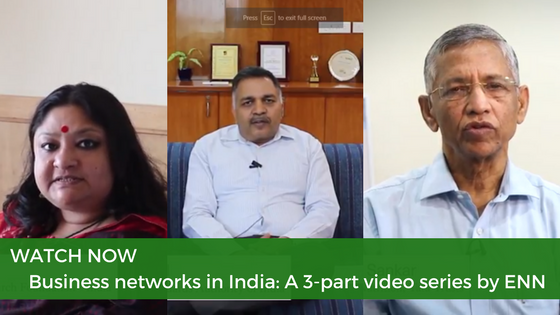Experiences from India on engaging with the private sector to improve nutrition
In this post, we share the outputs from a recent visit to Delhi by ENN’s Asia based Regional KM Specialist Dr Charulatha Banerjee. She worked on a 3-part video series which captures different perspectives on private sector engagement in nutrition from India. In recent years there have been some important changes in how government and NGOs are working with corporates to improve social and health outcomes, including nutrition, which has produced some interesting learning opportunities.
[vc_row row_type=”row” text_align=”left” css_animation=””][vc_column][vc_column_text custom_options=””]
For many people working in the nutrition sector or involved in efforts around nutrition scale up, understanding how the private sector can positively contribute to nutrition outcomes is a key priority. As part of ENN’s work as a partner of the SUN Movement, providing support on learning documentation and sharing, we have identified private sector/business engagement as an important area for knowledge capture. As there has been relatively little documentation so far and we will continue to work to document and understand how this is evolving to contribute to addressing this important knowledge gap and priority in the sector.
In this post, we share the outputs from a recent visit to Delhi by ENN’s Asia based Regional KM Specialist Dr Charulatha Banerjee. She worked on a 3-part video series which captures different perspectives on private sector engagement in nutrition from India. In recent years there have been some important changes in how government and NGOs are working with corporates to improve social and health outcomes, including nutrition, which has produced some interesting learning opportunities. For example, India was the first country in the world to introduce a law (in April 2014) which mandates that all large firms with earnings above a specified threshold must spend 2% of their net profits on Corporate Social Responsibility (CSR) projects. India also has a long history of work on food fortification which continues to expand in scope, through new initiatives such as food labelling and fortifying additional staple foods.
In this three-part series Dr Charulatha captures the experiences and reflections of three people – the Director of Nutrition at the large philanthropic organisation Tata Trusts (associated with one of the largest firms in the country), the CEO of the Food Standards Safety Authority in the Government of India, and the Director of Arupa Mission, an advisory NGO that supports corporates on how to shape their CSR spending.
Each video is linked to a discussion forum on ENN web forum en-net so please follow the links provided to share any questions or comments on these videos.[/vc_column_text][vc_separator type=”normal”][/vc_column][/vc_row][vc_row row_type=”row” text_align=”left” css_animation=””][vc_column][vc_column_text custom_options=””]
Part I
Dr Rajan Sankar, Director of Nutrition at Tata Trusts presents the vision of the trust formed by one of India’s oldest corporate houses and its philanthropic work across the country.
Join the discussion forum[/vc_column_text][vc_empty_space][/vc_column][/vc_row][vc_row row_type=”row” text_align=”left” css_animation=””][vc_column width=”1/2″][vc_video link=”https://www.youtube.com/watch?v=AeGKGxENBU4″][/vc_column][vc_column width=”1/2″][vc_column_text custom_options=””]Dr Sankar speaks from his long experience, including previous experience as the Asia Regional Advisor for GAIN, on early efforts to bring business to contribute responsibly to social goals and the importance of working closely with Governments to create sustainable change. He also speaks about work on food fortification in India highlighting the usefulness of double fortified salt.[/vc_column_text][/vc_column][/vc_row][vc_row row_type=”row” text_align=”left” css_animation=””][vc_column][vc_separator type=”normal”][vc_column_text custom_options=””]
Part II
The discussion on food fortification continues with Mr Pawan Agarwal, Chief Executive Officer Food Standards Safety Authority of India.
Join the discussion forum.[/vc_column_text][vc_empty_space][/vc_column][/vc_row][vc_row row_type=”row” text_align=”left” css_animation=””][vc_column width=”1/2″][vc_video link=”https://www.youtube.com/watch?v=dJPMShAMRtk”][/vc_column][vc_column width=”1/2″][vc_column_text custom_options=””]The Food Standards Safety Authority is the body for all matters related to food safety and standards in the country speaks about how food fortification has been introduced in India through a process of engagement with all stakeholders. He also outlines the steps being taken to introduce fortified staples in public distribution and midday meal schemes and discussed the challenges of taking fortification to scale in a largely decentralised Government system.[/vc_column_text][/vc_column][/vc_row][vc_row row_type=”row” text_align=”left” css_animation=””][vc_column][vc_separator type=”normal”][vc_column_text custom_options=””]
Part III
Sonali Patnaik, Director Arupa Mission Research Foundation, speaks extensively on the CSR law in India and how it is working and has potential to impact nutrition programming and spending.
Join the discussion forum[/vc_column_text][vc_empty_space][/vc_column][/vc_row][vc_row row_type=”row” text_align=”left” css_animation=””][vc_column width=”1/2″][vc_video link=”https://www.youtube.com/watch?v=VSzT-uKOQC0″][/vc_column][vc_column width=”1/2″][vc_column_text custom_options=””]Sonali Patnaik has clear pointers on how to engage effectively with corporate houses to make their CSR impactful and elaborates on the challenges of human resource within the private sector to deal with this new aspect of running a business. She also discusses the importance of leadership and how some corporate houses have managed to make CSR part of “business as usual”. She highlights several challenges with the law including alignment between government priorities and CSR funded programmes as well as some of the difficulties with M&E.[/vc_column_text][/vc_column][/vc_row][vc_row row_type=”row” text_align=”left” css_animation=””][vc_column][vc_separator type=”normal”][/vc_column][/vc_row][vc_row row_type=”row” text_align=”left” css_animation=””][vc_column][vc_column_text custom_options=””]Through ENN’s ongoing KM work to support the SUN Movement we will continue to work on documenting experiences around private sector engagement in nutrition, recognising that this is a new area for many in the nutrition sector with limited documentation on the “how to” of this engagement. ENN has also recently supported documentation of a SUN Business Network event in Africa which brought together SBN convenors from across the continent. We look forward sharing this and other content in the coming months.[/vc_column_text][/vc_column][/vc_row][vc_row row_type=”row” text_align=”left” css_animation=””][vc_column][vc_separator type=”normal”]